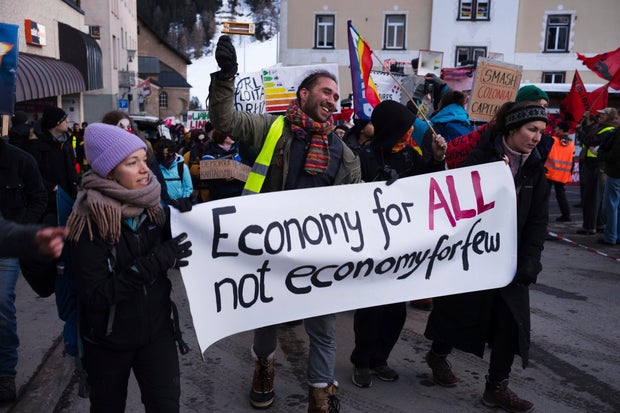Davos, Switzerland — BillionairesWealth grew three times faster in 2024 than the previous year, a leading anti-poverty group reported Monday, as some of the world’s political and financial elite prepared for an annual gathering in Davos, in Switzerland.
Oxfam Internationalin its latest assessment of global inequalities, scheduled for the opening of World Economic Forum meeting, also predicts that at least five trillionaires will arise over the next decade. A year ago, the group predicted that only one billionaire would emerge during this period.
OxFam’s research adds weight to a warning from outgoing President Biden last week of a “dangerous concentration of power in the hands of a very small number of ultra-rich people”. The group’s incisive report, titled “Takers Not Makers,” also says the number of people living in poverty has barely budged since 1990.
The World Economic Forum plans to welcome some 3,000 participants, including business executives, academics, government officials and civic group leaders, to its annual meeting in the Alpine village of Davos.
Markus Schreiber / AP
President-elect Donald Trump, who visited Davos twice during his first term and was expected take oath on Mondayis expected to participate via video in the forum event on Thursday. He has long championed the accumulation of wealth – including his own – and counts multi-billionaire Elon Musk among his top advisers.
“What you’re seeing right now is a billionaire president being sworn in, backed by the richest man. So that’s pretty much the jewel in the crown of global oligarchies,” said Amitabh Behar, director executive of Oxfam International. an interview, referring to Trump and Musk.
“It’s not about any one individual. It’s about the economic system we’ve created in which billionaires are now able to shape economic and social policies, ultimately earning them more and more money. profits,” he added.
Much like Biden’s call for billionaires to “start paying their fair share” through the US tax code, Oxfam – an international advocacy group – has called on governments to tax the richest to reduce inequality and extreme wealth, and to “dismantle the new aristocracy”.
The group called for measures such as breaking up monopolies, capping CEO salaries and regulating companies to ensure they pay “living wages” to workers.
Many investors have made strong gains in 2024, with strong performance for big tech companies and stock indexes like the S&P 500, as well as the price of gold and cryptocurrencies like Bitcoin.
According to Oxfam, the wealth of billionaires increased by $2 trillion last year, or about $5.7 billion per day, three times faster than in 2023. The number of billionaires increased by 204 per reach 2,769, and the 10 richest men saw their wealth increase by almost $100 million per day. on average, he said.
Citing World Bank data, the group highlighted persistent poverty, saying the number of people living on less than $6.85 a day has “barely changed” since 1990. Oxfam used Forbes’ “Real-Time Billionaires List” at the end of November for data on the ultra-rich.
In contrast, at least four new billionaires were “created” every week in 2024, and three-fifths of billionaires’ wealth comes from inheritance, monopoly power or “crony relationships,” it says. .
On average, according to Oxfam, low- and middle-income countries spend almost half of their national budgets on debt repayment. He also noted that life expectancy in Africa is slightly lower at 64 years, compared to more than 79 years in Europe.
Despite the growing gap between the richest and the poor, the annual conference in Davos, which officially begins on Tuesday, is likely to focus again this year on chasing money and making deals, with a rise in power of Strong leaders in some Western countries and progressive causes like diversity and climate change are declining in the business world.
THE continued rise of artificial intelligence as a tool for businesses to achieve greater efficiency, will also again be a central theme at Davos, despite concerns in many sectors that AI could upend many white-collar jobs and displace workers across a wide range of industries.
Trump’s return for a second term will likely be on everyone’s lips at Davos, as will ongoing conflicts, including the wars in Ukraine and Sudan, as well as hopes of continued political conflict. ceasefire which began on Sunday between Hamas and Israel, ending their devastating 15-month war in Gaza.
Forum organizers last week released a survey of 900 experts for the “Global Risks Report,” which found that conflicts between countries were the top concern, followed by extreme weather, economic confrontation, misinformation and misinformation, and “societal polarization” – a nod to the divide between rich and poor.
As in previous years, demonstrators calling for more economic equality, taxes on the rich and other demands took to the streets.
Markus Schreiber / AP
Some blocked roads leading to Davos, hampering traffic in places and delaying travel for some participants in the event, which runs until Friday.



